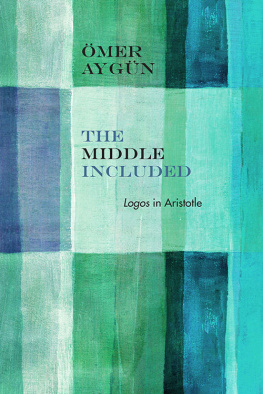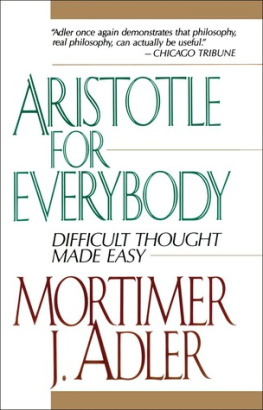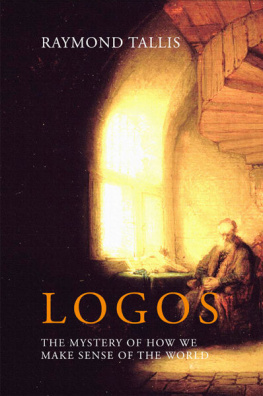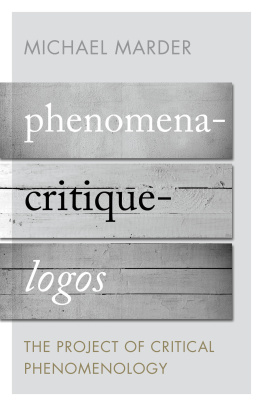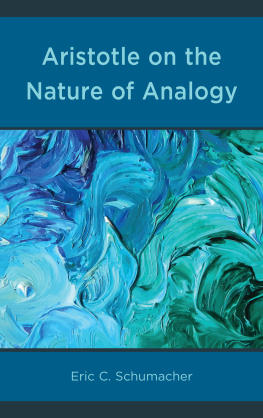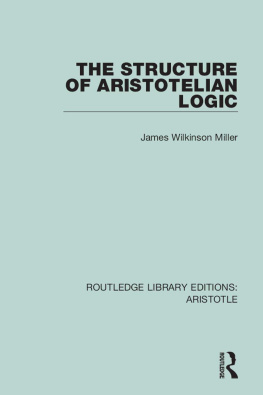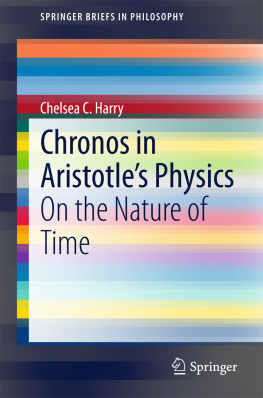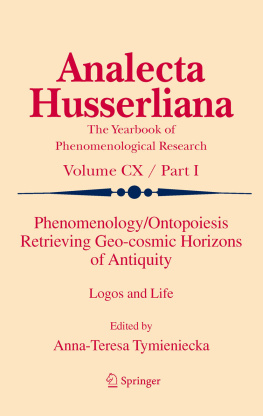THE MIDDLE INCLUDED
SERIES EDITOR
John Russon

The Middle Included
Logos in Aristotle
mer Aygn
NORTHWESTERN UNIVERSITY PRESS EVANSTON, ILLINOIS

Northwestern University Press www.nupress.northwestern.edu Copyright 2017 by Northwestern University Press. Published 2017. All rights reserved. Library of Congress Cataloging-in-Publication Data Names: Aygn, mer, 1975 Title: The middle included : logos in Aristotle / mer Aygn. Other titles: Rereading ancient philosophy. Description: Evanston, Illinois : Northwestern University Press, 2016. | Series: Rereading ancient philosophy | Based on the authors dissertation (Pennsylvania State University, 2007) Identifiers: LCCN 2016034273 | ISBN 9780810134003 (pbk. : alk. paper) | ISBN 9780810134010 (cloth : alk. paper) | ISBN 9780810134027 (e-book) Subjects: LCSH: Aristotle. | Logos (Philosophy) Classification: LCC B491.L64 A94 2016 | DDC 185dc23 LC record available at https://lccn.loc.gov/2016034273 A note to the reader: This e-book has been produced to offer maximum consistency across all supported e-readers. However, e-reading technologies vary, and text display can also change dramatically depending on user choices. Therefore, you occasionally may encounter small discrepancies from the print edition, especially with respect to indents, fonts, symbols, and line breaks. Furthermore, some features of the print edition, such as photographs, may be missing due to permissions restrictions.
Canm annemle babam Gzin ve Birol Aygne
CONTENTS
I would like to thank the Department of Philosophy at Pennsylvania State University, which provided me an educational and therefore philosophical environment between 2001 and 2005, the Fulbright Foundation which granted me optimum work conditions for research in 20056, and the Projects of Scientific Research at Galatasaray University which enabled me to turn my dissertation into this book.
I am deeply grateful to Robert D. Metcalf and Eli Diamond for their detailed notes and fair criticisms concerning the text in its manuscript form; to the members of the committee of my dissertation on which this book is based, Daniel Conway, Veronique Fti, Christopher P. Long, and Mark Munn, for their suggestions and encouragement after reading the earliest version of this book; and also to Rmi Brague, Pierre Pellegrin, Jean-Louis Labarrire, and Annick Jaulin for their insightful remarks during my presentations of parts of it. I am also very much indebted to my friends, Katherine Loewy, Eric Sanday, Hakan Ycefer, Sean D. Kirkland, David Bronstein, Gregory Recco, William Harwood, Refik Gremen, Ali akr, and Michael Schleeter, for their companionship and challenges.
I cannot express enough my indebtedness to John Russon who directed my dissertation with immense philosophical motivation and genuine friendship, and honored my work by including it in its present form in the series Rereading Ancient Philosophy at Northwestern University Press. I am also grateful to Maggie Grossman, Henry Lowell Carrigan, Anne E. Gendler, and Nathan MacBrien at the Northwestern University Press for their help during the editorial preparation of the book in its published form.
Finally, I am most indebted to my wife, Ayenur Nuholu, for the constant support and diligent criticism she brought to these pages. Indeed, none of the above is to be held responsible for any shortcomings in the following, but the rest of it could not be written without them.
Works by Aristotle (for complete bibliographic information, see pages 24952)
APo. Posterior Analytics
APr. Prior Analytics
Cael. De Caelo, On the Heavens
Cat. Categories
DA De Anima, On the Soul
De sensu On Sense and Sensible Objects
EE Eudemian Ethics
GA Generation of Animals
GC On Generation and Corruption
HA History of Animals
MA On the Movement of Animals
Metaph. Metaphysics
Mete. Meteorology
NE Nicomachean Ethics
On Int. On Interpretation
PA Parts of Animals
Ph. Physics
Po. Poetics
Pol. Politics
Prob. Problems
Protrep. Protrepticus
Rh. Rhetoric
SE Sophistici Elenchi, Sophistical Refutations
Top. Topics
Secondary Works
DK Diels and Kranz, 1956
KRS Kirk, Raven, and Schofield, 1983
LSJ Liddell, Scott, and Jones, 1996
The project of this book originated from my fascination with quite a humble natural phenomenon. I will explore this issue at length in chapter 6, but let me briefly talk about it just so that the reader may have an idea about where this book came from.
A scout honeybee sees flowers to exploit in a certain field. She returns to the hive, and describes her firsthand experience of the location and quality of the bounty to the other bees. Of course, these bees understand the message, since they will fly off to the exact location and exploit the field. And indeed, when they return to the hive, they too can convey their new firsthand experience to still others. But before they have this firsthand experience, they do not or cannot relay to others what for them is not a firsthand experience.
Honeybees seem capable of understanding what is for them a non-firsthand experience, but not of relaying it. There are indeed animal species that are capable of relaying non-firsthand experience, especially animals that imitate. But while these species are capable of relaying this non-firsthand experience, they seem to do so without understanding it.
Is there an animal species that has the capacity for both understanding and relaying non-firsthand experiences? Of course. We, humans, indulge in this capacity. We understand non-firsthand experience as honeybees do, but we can also relay it. We relay non-firsthand experience like, say, imitating bird species do, but we do so while understanding that of which we never had, do not have, or may never have, a firsthand experience. A sentence like I feel great today is comparable to the message the scout honeybee conveyed to the other bees: I convey my firsthand experience to you who are capable of understanding what, for you, is not a firsthand experience. But when you say to others, mer is feeling great today, something different is happening: like honeybees and unlike imitating birds, you are understanding a non-firsthand experience, but, like those bird species and unlike honeybees, you are also relaying that content to others. Since your audience may also relay the same information to still others, this capacity boosts the speed with which information is propagated. As there is no relay among honeybees, only the scout honeybee can inform other bees. Hence, the rate of propagation of that information will follow a linear growth . Among humans in everyday life, however, since the receiver can in turn relay the message to still others without having to undergo the experience firsthand, the propagation of information can grow exponentially .
But this capacity is not only ubiquitous in our everyday exchanges. It also sheds light on significant aspects of human experience. For it is this capacity that enables me to communicate, not only that I feel great today, but also that Socrates was executed in 399, that there are igneous rocks on the surface of the moon, and that the form circle can be instantiated in an infinite number of cases. I had understood these messages, as you just did, without ever needing to have a firsthand experience of Socratess death, of the surface of the moon, or, indeed, of the infinite instantiations of the form circle.
Actually, almost all science, all fiction, all history, all news media, all education, all propaganda, all gossip, all utopian fiction, all sophistry as well as all philosophy structurally require that the message relayed be such that its content was not, is not, or even cannot be, experienced firsthand. Yet indeed, when I speak, I may be expressing my firsthand experience, but I may also be lying, I may be relaying something I heard from someone else who has heard it who knows where. Further, you may further propagate this dubious message without having to check its truthfulness. So I am exercising this capacity not only when I say that Socrates was executed in 399, but also when I say that Socrates was not executed in 399. Again, I am drawing on the same capacity when I say, regardless of their actual or potential truth-value, that Athenians will regret their execution of Socrates, or that his execution was ordained by fate, that he will converse with great poets in the afterlife, or that he will be resurrected. So, besides our everyday communications, it is the major human institutions and traditions that require this capacity for both understanding and relaying non-firsthand experience. And once the communicating parties possess this capacity, there is no preestablished control over the truthfulness of the messages. This capacity pervades our experience. And with it, truth, for us, becomes less a given than a task.
Next page
